Case Studies: Legal and Ethical Considerations in Child & Family Care
VerifiedAdded on 2022/08/20
|11
|2605
|24
Case Study
AI Summary
This assignment presents three case studies focusing on legal and ethical considerations in child and family care. The first case involves parents avoiding vaccinating their child, exploring issues of patient autonomy, beneficence, and non-maleficence. The nurse's role in patient education and multidisciplinary collaboration is emphasized. The second case discusses a 15-year-old diagnosed with Chlamydia, highlighting patient confidentiality, family-centered care, and legal consent for minors. The importance of involving the family and providing comprehensive care is underscored. The third case examines a child potentially experiencing harassment, addressing mandated reporting requirements, collaboration with child welfare groups, and holistic support. The assignment concludes by emphasizing the nurse's role in balancing legal obligations, ethical considerations, and patient-centered care, advocating for education, collaboration, and holistic approaches.
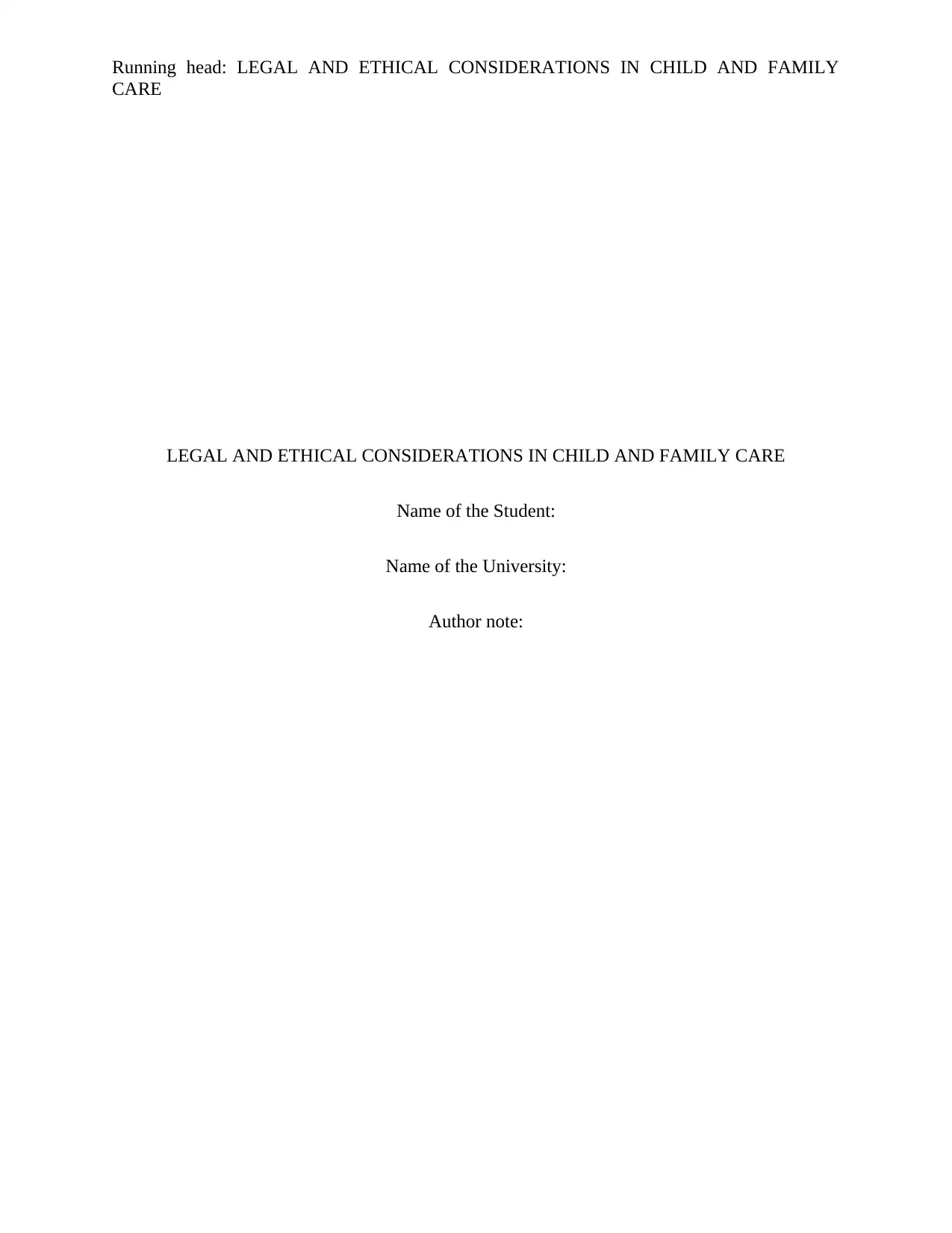
Running head: LEGAL AND ETHICAL CONSIDERATIONS IN CHILD AND FAMILY
CARE
LEGAL AND ETHICAL CONSIDERATIONS IN CHILD AND FAMILY CARE
Name of the Student:
Name of the University:
Author note:
CARE
LEGAL AND ETHICAL CONSIDERATIONS IN CHILD AND FAMILY CARE
Name of the Student:
Name of the University:
Author note:
Paraphrase This Document
Need a fresh take? Get an instant paraphrase of this document with our AI Paraphraser
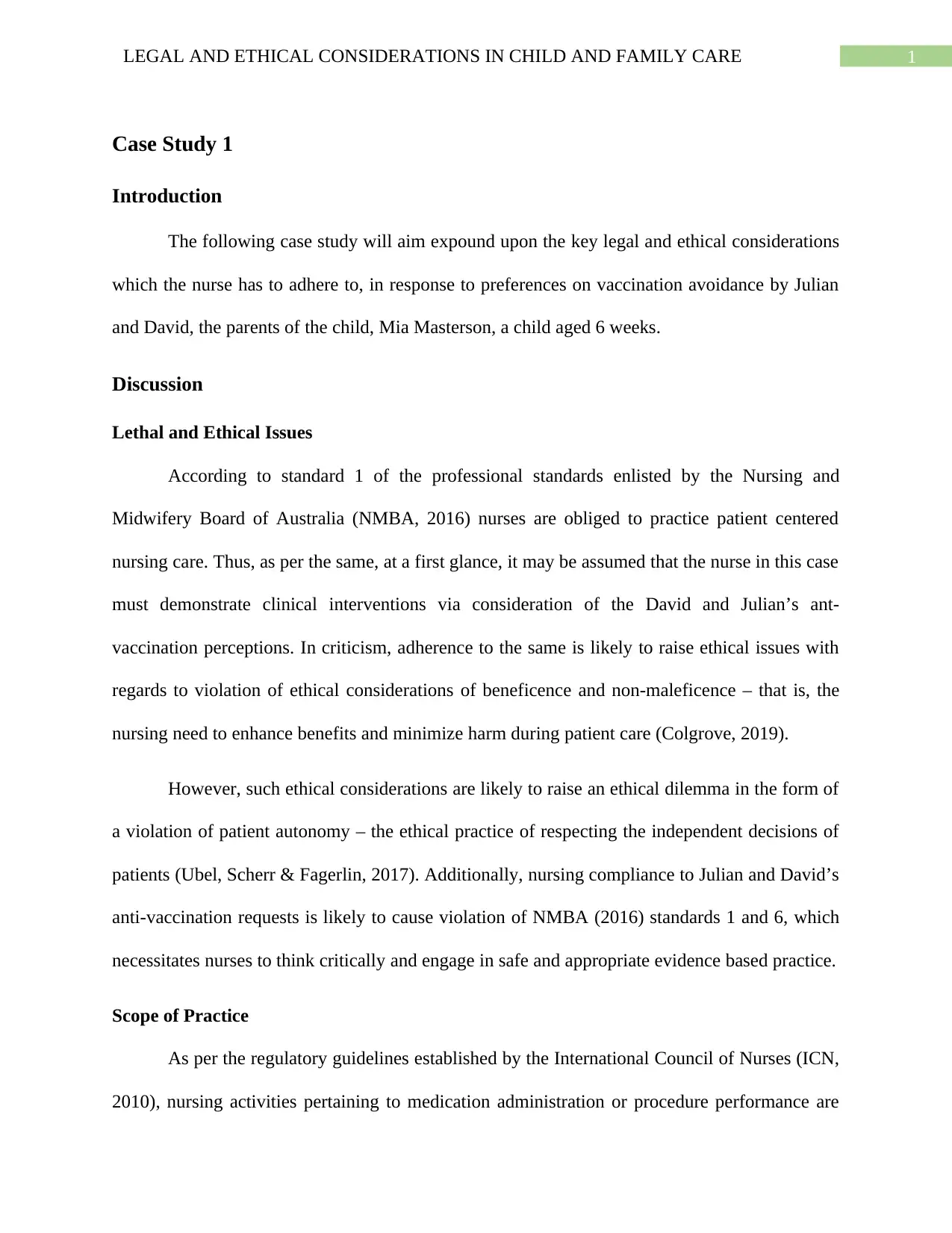
1LEGAL AND ETHICAL CONSIDERATIONS IN CHILD AND FAMILY CARE
Case Study 1
Introduction
The following case study will aim expound upon the key legal and ethical considerations
which the nurse has to adhere to, in response to preferences on vaccination avoidance by Julian
and David, the parents of the child, Mia Masterson, a child aged 6 weeks.
Discussion
Lethal and Ethical Issues
According to standard 1 of the professional standards enlisted by the Nursing and
Midwifery Board of Australia (NMBA, 2016) nurses are obliged to practice patient centered
nursing care. Thus, as per the same, at a first glance, it may be assumed that the nurse in this case
must demonstrate clinical interventions via consideration of the David and Julian’s ant-
vaccination perceptions. In criticism, adherence to the same is likely to raise ethical issues with
regards to violation of ethical considerations of beneficence and non-maleficence – that is, the
nursing need to enhance benefits and minimize harm during patient care (Colgrove, 2019).
However, such ethical considerations are likely to raise an ethical dilemma in the form of
a violation of patient autonomy – the ethical practice of respecting the independent decisions of
patients (Ubel, Scherr & Fagerlin, 2017). Additionally, nursing compliance to Julian and David’s
anti-vaccination requests is likely to cause violation of NMBA (2016) standards 1 and 6, which
necessitates nurses to think critically and engage in safe and appropriate evidence based practice.
Scope of Practice
As per the regulatory guidelines established by the International Council of Nurses (ICN,
2010), nursing activities pertaining to medication administration or procedure performance are
Case Study 1
Introduction
The following case study will aim expound upon the key legal and ethical considerations
which the nurse has to adhere to, in response to preferences on vaccination avoidance by Julian
and David, the parents of the child, Mia Masterson, a child aged 6 weeks.
Discussion
Lethal and Ethical Issues
According to standard 1 of the professional standards enlisted by the Nursing and
Midwifery Board of Australia (NMBA, 2016) nurses are obliged to practice patient centered
nursing care. Thus, as per the same, at a first glance, it may be assumed that the nurse in this case
must demonstrate clinical interventions via consideration of the David and Julian’s ant-
vaccination perceptions. In criticism, adherence to the same is likely to raise ethical issues with
regards to violation of ethical considerations of beneficence and non-maleficence – that is, the
nursing need to enhance benefits and minimize harm during patient care (Colgrove, 2019).
However, such ethical considerations are likely to raise an ethical dilemma in the form of
a violation of patient autonomy – the ethical practice of respecting the independent decisions of
patients (Ubel, Scherr & Fagerlin, 2017). Additionally, nursing compliance to Julian and David’s
anti-vaccination requests is likely to cause violation of NMBA (2016) standards 1 and 6, which
necessitates nurses to think critically and engage in safe and appropriate evidence based practice.
Scope of Practice
As per the regulatory guidelines established by the International Council of Nurses (ICN,
2010), nursing activities pertaining to medication administration or procedure performance are
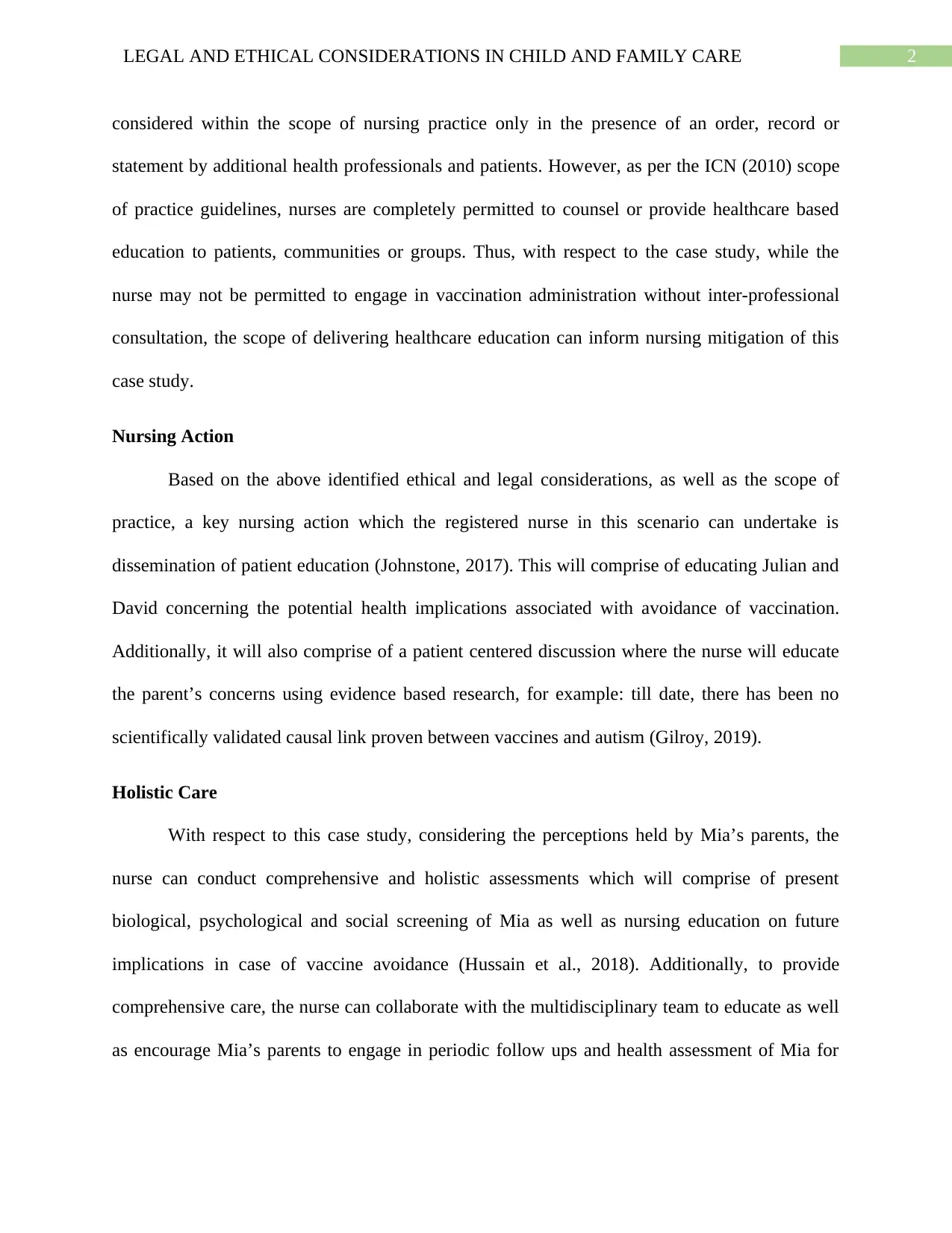
2LEGAL AND ETHICAL CONSIDERATIONS IN CHILD AND FAMILY CARE
considered within the scope of nursing practice only in the presence of an order, record or
statement by additional health professionals and patients. However, as per the ICN (2010) scope
of practice guidelines, nurses are completely permitted to counsel or provide healthcare based
education to patients, communities or groups. Thus, with respect to the case study, while the
nurse may not be permitted to engage in vaccination administration without inter-professional
consultation, the scope of delivering healthcare education can inform nursing mitigation of this
case study.
Nursing Action
Based on the above identified ethical and legal considerations, as well as the scope of
practice, a key nursing action which the registered nurse in this scenario can undertake is
dissemination of patient education (Johnstone, 2017). This will comprise of educating Julian and
David concerning the potential health implications associated with avoidance of vaccination.
Additionally, it will also comprise of a patient centered discussion where the nurse will educate
the parent’s concerns using evidence based research, for example: till date, there has been no
scientifically validated causal link proven between vaccines and autism (Gilroy, 2019).
Holistic Care
With respect to this case study, considering the perceptions held by Mia’s parents, the
nurse can conduct comprehensive and holistic assessments which will comprise of present
biological, psychological and social screening of Mia as well as nursing education on future
implications in case of vaccine avoidance (Hussain et al., 2018). Additionally, to provide
comprehensive care, the nurse can collaborate with the multidisciplinary team to educate as well
as encourage Mia’s parents to engage in periodic follow ups and health assessment of Mia for
considered within the scope of nursing practice only in the presence of an order, record or
statement by additional health professionals and patients. However, as per the ICN (2010) scope
of practice guidelines, nurses are completely permitted to counsel or provide healthcare based
education to patients, communities or groups. Thus, with respect to the case study, while the
nurse may not be permitted to engage in vaccination administration without inter-professional
consultation, the scope of delivering healthcare education can inform nursing mitigation of this
case study.
Nursing Action
Based on the above identified ethical and legal considerations, as well as the scope of
practice, a key nursing action which the registered nurse in this scenario can undertake is
dissemination of patient education (Johnstone, 2017). This will comprise of educating Julian and
David concerning the potential health implications associated with avoidance of vaccination.
Additionally, it will also comprise of a patient centered discussion where the nurse will educate
the parent’s concerns using evidence based research, for example: till date, there has been no
scientifically validated causal link proven between vaccines and autism (Gilroy, 2019).
Holistic Care
With respect to this case study, considering the perceptions held by Mia’s parents, the
nurse can conduct comprehensive and holistic assessments which will comprise of present
biological, psychological and social screening of Mia as well as nursing education on future
implications in case of vaccine avoidance (Hussain et al., 2018). Additionally, to provide
comprehensive care, the nurse can collaborate with the multidisciplinary team to educate as well
as encourage Mia’s parents to engage in periodic follow ups and health assessment of Mia for
⊘ This is a preview!⊘
Do you want full access?
Subscribe today to unlock all pages.

Trusted by 1+ million students worldwide
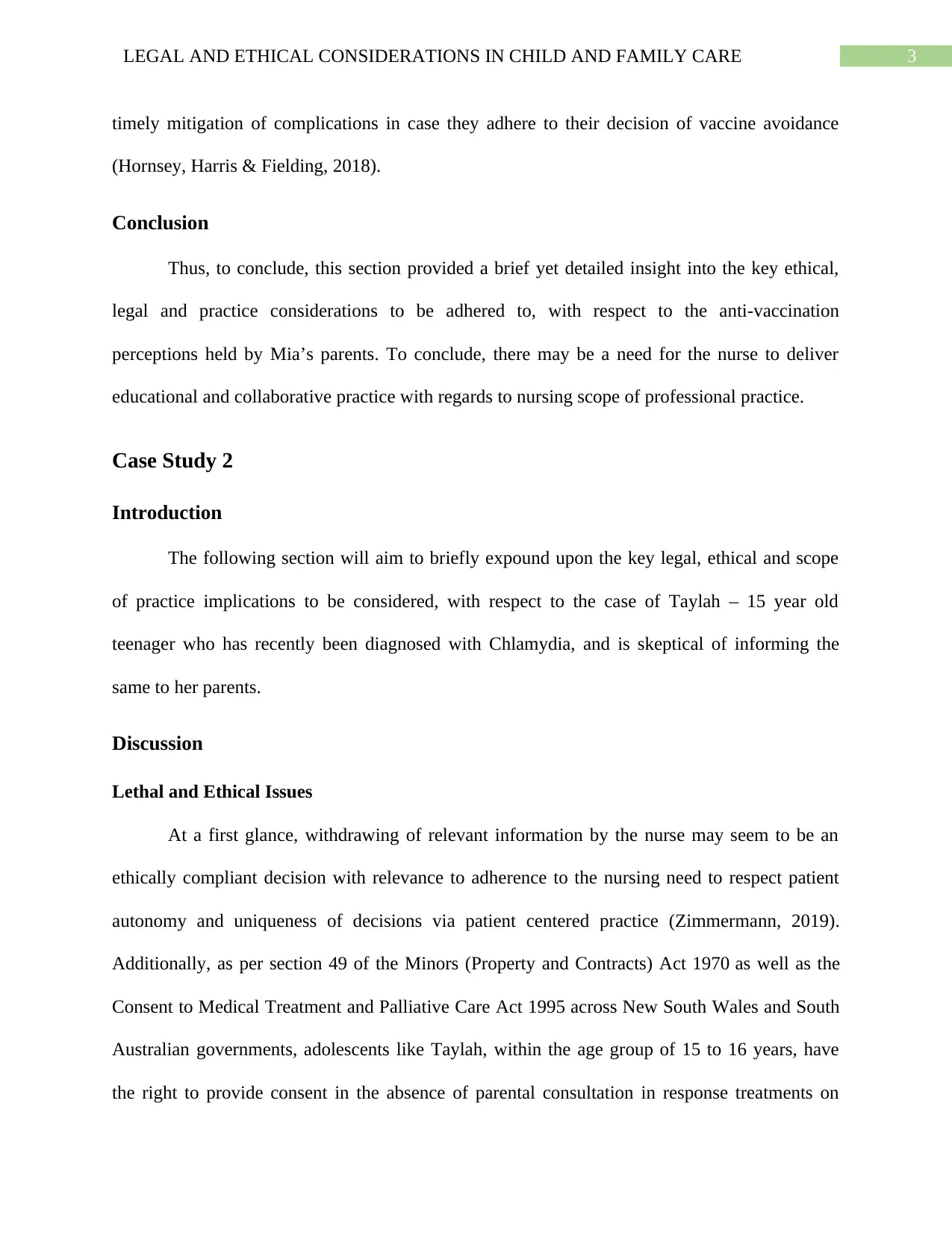
3LEGAL AND ETHICAL CONSIDERATIONS IN CHILD AND FAMILY CARE
timely mitigation of complications in case they adhere to their decision of vaccine avoidance
(Hornsey, Harris & Fielding, 2018).
Conclusion
Thus, to conclude, this section provided a brief yet detailed insight into the key ethical,
legal and practice considerations to be adhered to, with respect to the anti-vaccination
perceptions held by Mia’s parents. To conclude, there may be a need for the nurse to deliver
educational and collaborative practice with regards to nursing scope of professional practice.
Case Study 2
Introduction
The following section will aim to briefly expound upon the key legal, ethical and scope
of practice implications to be considered, with respect to the case of Taylah – 15 year old
teenager who has recently been diagnosed with Chlamydia, and is skeptical of informing the
same to her parents.
Discussion
Lethal and Ethical Issues
At a first glance, withdrawing of relevant information by the nurse may seem to be an
ethically compliant decision with relevance to adherence to the nursing need to respect patient
autonomy and uniqueness of decisions via patient centered practice (Zimmermann, 2019).
Additionally, as per section 49 of the Minors (Property and Contracts) Act 1970 as well as the
Consent to Medical Treatment and Palliative Care Act 1995 across New South Wales and South
Australian governments, adolescents like Taylah, within the age group of 15 to 16 years, have
the right to provide consent in the absence of parental consultation in response treatments on
timely mitigation of complications in case they adhere to their decision of vaccine avoidance
(Hornsey, Harris & Fielding, 2018).
Conclusion
Thus, to conclude, this section provided a brief yet detailed insight into the key ethical,
legal and practice considerations to be adhered to, with respect to the anti-vaccination
perceptions held by Mia’s parents. To conclude, there may be a need for the nurse to deliver
educational and collaborative practice with regards to nursing scope of professional practice.
Case Study 2
Introduction
The following section will aim to briefly expound upon the key legal, ethical and scope
of practice implications to be considered, with respect to the case of Taylah – 15 year old
teenager who has recently been diagnosed with Chlamydia, and is skeptical of informing the
same to her parents.
Discussion
Lethal and Ethical Issues
At a first glance, withdrawing of relevant information by the nurse may seem to be an
ethically compliant decision with relevance to adherence to the nursing need to respect patient
autonomy and uniqueness of decisions via patient centered practice (Zimmermann, 2019).
Additionally, as per section 49 of the Minors (Property and Contracts) Act 1970 as well as the
Consent to Medical Treatment and Palliative Care Act 1995 across New South Wales and South
Australian governments, adolescents like Taylah, within the age group of 15 to 16 years, have
the right to provide consent in the absence of parental consultation in response treatments on
Paraphrase This Document
Need a fresh take? Get an instant paraphrase of this document with our AI Paraphraser
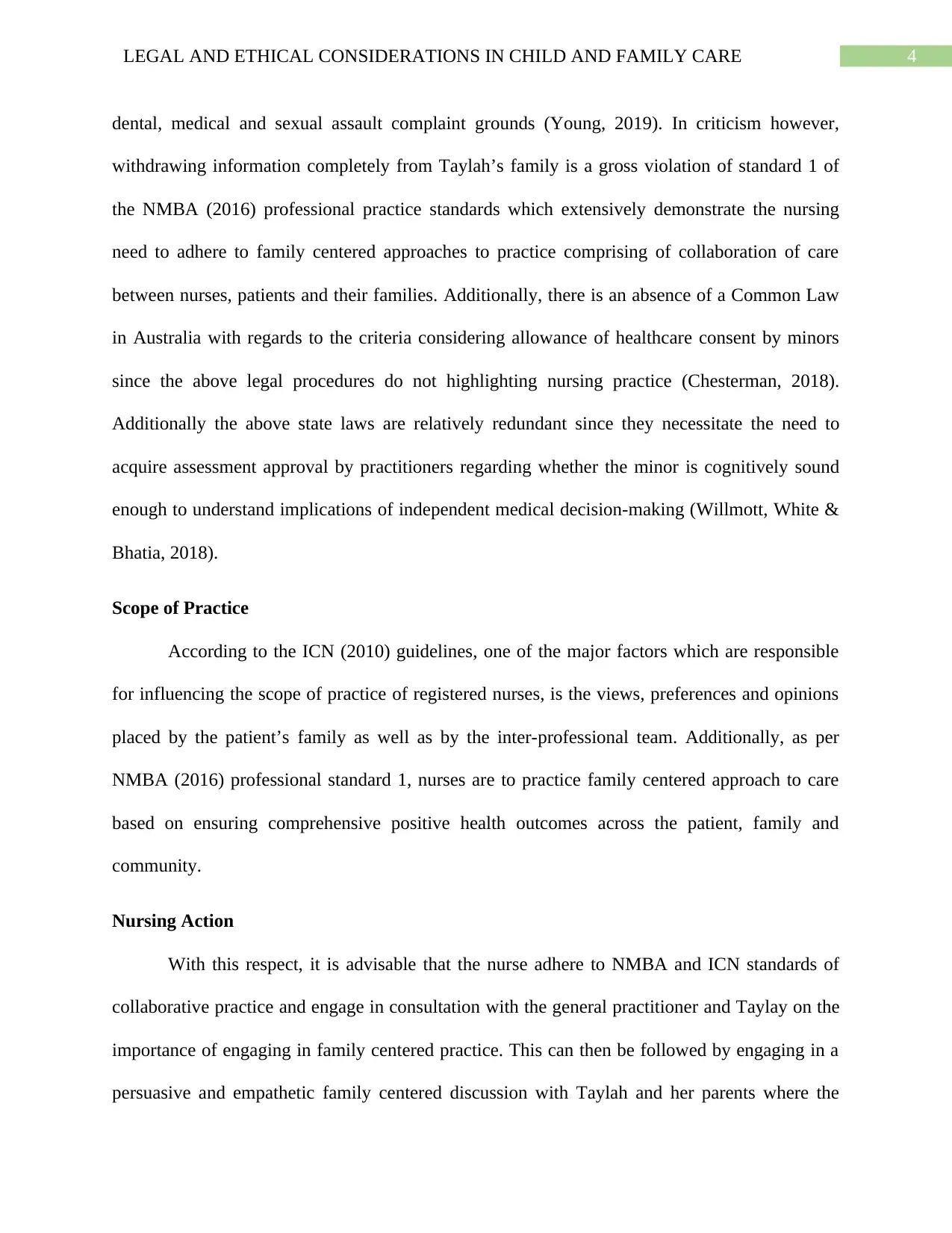
4LEGAL AND ETHICAL CONSIDERATIONS IN CHILD AND FAMILY CARE
dental, medical and sexual assault complaint grounds (Young, 2019). In criticism however,
withdrawing information completely from Taylah’s family is a gross violation of standard 1 of
the NMBA (2016) professional practice standards which extensively demonstrate the nursing
need to adhere to family centered approaches to practice comprising of collaboration of care
between nurses, patients and their families. Additionally, there is an absence of a Common Law
in Australia with regards to the criteria considering allowance of healthcare consent by minors
since the above legal procedures do not highlighting nursing practice (Chesterman, 2018).
Additionally the above state laws are relatively redundant since they necessitate the need to
acquire assessment approval by practitioners regarding whether the minor is cognitively sound
enough to understand implications of independent medical decision-making (Willmott, White &
Bhatia, 2018).
Scope of Practice
According to the ICN (2010) guidelines, one of the major factors which are responsible
for influencing the scope of practice of registered nurses, is the views, preferences and opinions
placed by the patient’s family as well as by the inter-professional team. Additionally, as per
NMBA (2016) professional standard 1, nurses are to practice family centered approach to care
based on ensuring comprehensive positive health outcomes across the patient, family and
community.
Nursing Action
With this respect, it is advisable that the nurse adhere to NMBA and ICN standards of
collaborative practice and engage in consultation with the general practitioner and Taylay on the
importance of engaging in family centered practice. This can then be followed by engaging in a
persuasive and empathetic family centered discussion with Taylah and her parents where the
dental, medical and sexual assault complaint grounds (Young, 2019). In criticism however,
withdrawing information completely from Taylah’s family is a gross violation of standard 1 of
the NMBA (2016) professional practice standards which extensively demonstrate the nursing
need to adhere to family centered approaches to practice comprising of collaboration of care
between nurses, patients and their families. Additionally, there is an absence of a Common Law
in Australia with regards to the criteria considering allowance of healthcare consent by minors
since the above legal procedures do not highlighting nursing practice (Chesterman, 2018).
Additionally the above state laws are relatively redundant since they necessitate the need to
acquire assessment approval by practitioners regarding whether the minor is cognitively sound
enough to understand implications of independent medical decision-making (Willmott, White &
Bhatia, 2018).
Scope of Practice
According to the ICN (2010) guidelines, one of the major factors which are responsible
for influencing the scope of practice of registered nurses, is the views, preferences and opinions
placed by the patient’s family as well as by the inter-professional team. Additionally, as per
NMBA (2016) professional standard 1, nurses are to practice family centered approach to care
based on ensuring comprehensive positive health outcomes across the patient, family and
community.
Nursing Action
With this respect, it is advisable that the nurse adhere to NMBA and ICN standards of
collaborative practice and engage in consultation with the general practitioner and Taylay on the
importance of engaging in family centered practice. This can then be followed by engaging in a
persuasive and empathetic family centered discussion with Taylah and her parents where the
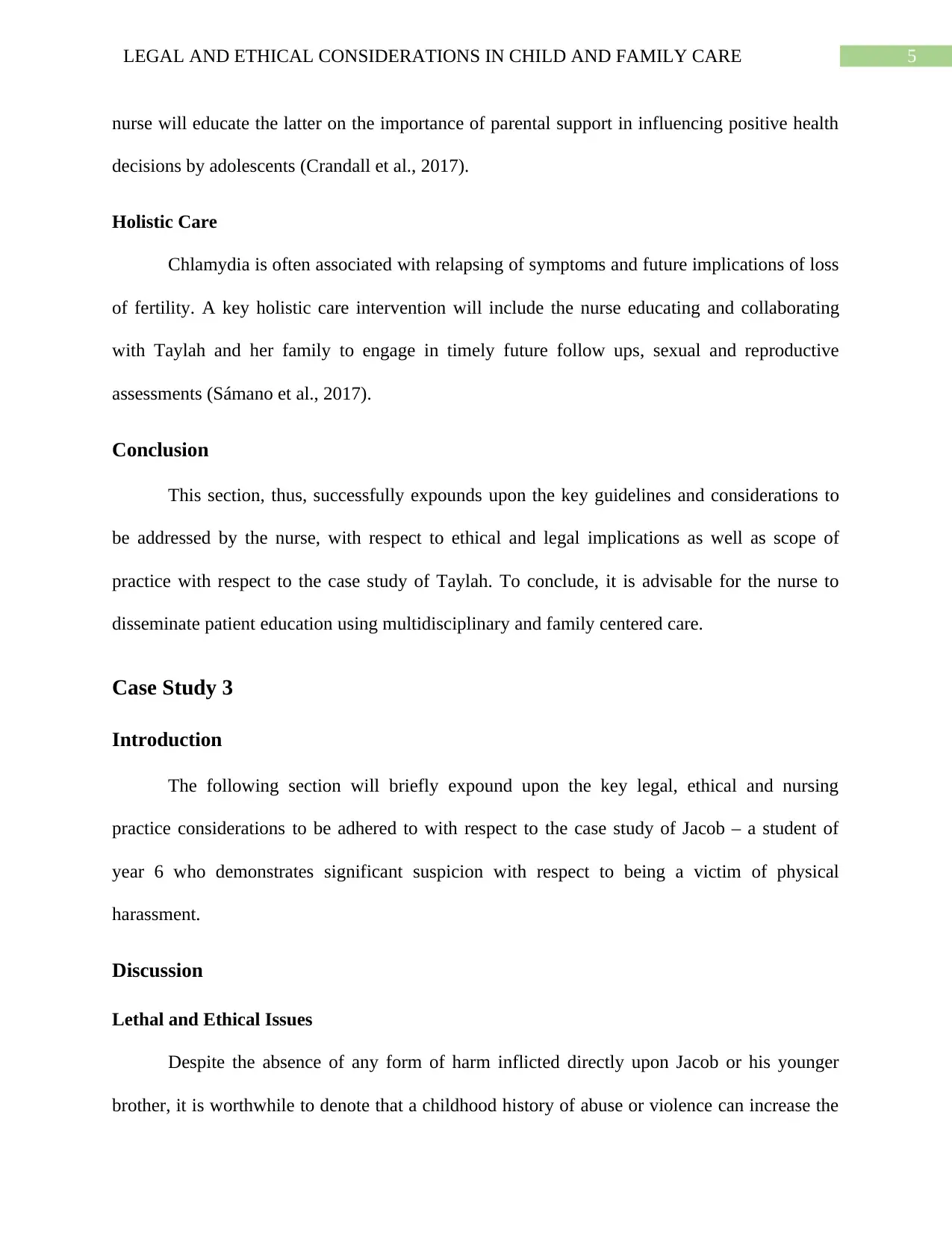
5LEGAL AND ETHICAL CONSIDERATIONS IN CHILD AND FAMILY CARE
nurse will educate the latter on the importance of parental support in influencing positive health
decisions by adolescents (Crandall et al., 2017).
Holistic Care
Chlamydia is often associated with relapsing of symptoms and future implications of loss
of fertility. A key holistic care intervention will include the nurse educating and collaborating
with Taylah and her family to engage in timely future follow ups, sexual and reproductive
assessments (Sámano et al., 2017).
Conclusion
This section, thus, successfully expounds upon the key guidelines and considerations to
be addressed by the nurse, with respect to ethical and legal implications as well as scope of
practice with respect to the case study of Taylah. To conclude, it is advisable for the nurse to
disseminate patient education using multidisciplinary and family centered care.
Case Study 3
Introduction
The following section will briefly expound upon the key legal, ethical and nursing
practice considerations to be adhered to with respect to the case study of Jacob – a student of
year 6 who demonstrates significant suspicion with respect to being a victim of physical
harassment.
Discussion
Lethal and Ethical Issues
Despite the absence of any form of harm inflicted directly upon Jacob or his younger
brother, it is worthwhile to denote that a childhood history of abuse or violence can increase the
nurse will educate the latter on the importance of parental support in influencing positive health
decisions by adolescents (Crandall et al., 2017).
Holistic Care
Chlamydia is often associated with relapsing of symptoms and future implications of loss
of fertility. A key holistic care intervention will include the nurse educating and collaborating
with Taylah and her family to engage in timely future follow ups, sexual and reproductive
assessments (Sámano et al., 2017).
Conclusion
This section, thus, successfully expounds upon the key guidelines and considerations to
be addressed by the nurse, with respect to ethical and legal implications as well as scope of
practice with respect to the case study of Taylah. To conclude, it is advisable for the nurse to
disseminate patient education using multidisciplinary and family centered care.
Case Study 3
Introduction
The following section will briefly expound upon the key legal, ethical and nursing
practice considerations to be adhered to with respect to the case study of Jacob – a student of
year 6 who demonstrates significant suspicion with respect to being a victim of physical
harassment.
Discussion
Lethal and Ethical Issues
Despite the absence of any form of harm inflicted directly upon Jacob or his younger
brother, it is worthwhile to denote that a childhood history of abuse or violence can increase the
⊘ This is a preview!⊘
Do you want full access?
Subscribe today to unlock all pages.

Trusted by 1+ million students worldwide
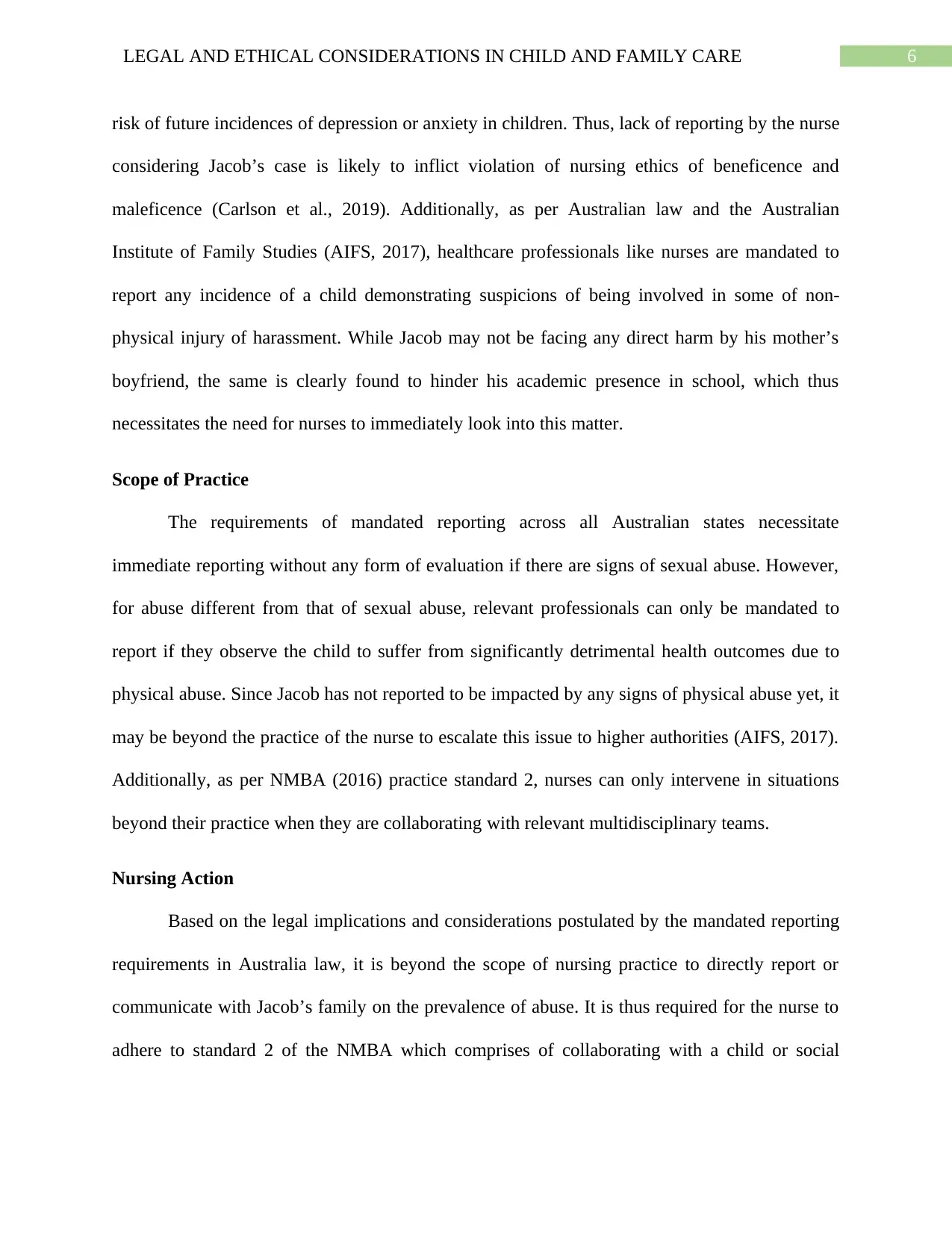
6LEGAL AND ETHICAL CONSIDERATIONS IN CHILD AND FAMILY CARE
risk of future incidences of depression or anxiety in children. Thus, lack of reporting by the nurse
considering Jacob’s case is likely to inflict violation of nursing ethics of beneficence and
maleficence (Carlson et al., 2019). Additionally, as per Australian law and the Australian
Institute of Family Studies (AIFS, 2017), healthcare professionals like nurses are mandated to
report any incidence of a child demonstrating suspicions of being involved in some of non-
physical injury of harassment. While Jacob may not be facing any direct harm by his mother’s
boyfriend, the same is clearly found to hinder his academic presence in school, which thus
necessitates the need for nurses to immediately look into this matter.
Scope of Practice
The requirements of mandated reporting across all Australian states necessitate
immediate reporting without any form of evaluation if there are signs of sexual abuse. However,
for abuse different from that of sexual abuse, relevant professionals can only be mandated to
report if they observe the child to suffer from significantly detrimental health outcomes due to
physical abuse. Since Jacob has not reported to be impacted by any signs of physical abuse yet, it
may be beyond the practice of the nurse to escalate this issue to higher authorities (AIFS, 2017).
Additionally, as per NMBA (2016) practice standard 2, nurses can only intervene in situations
beyond their practice when they are collaborating with relevant multidisciplinary teams.
Nursing Action
Based on the legal implications and considerations postulated by the mandated reporting
requirements in Australia law, it is beyond the scope of nursing practice to directly report or
communicate with Jacob’s family on the prevalence of abuse. It is thus required for the nurse to
adhere to standard 2 of the NMBA which comprises of collaborating with a child or social
risk of future incidences of depression or anxiety in children. Thus, lack of reporting by the nurse
considering Jacob’s case is likely to inflict violation of nursing ethics of beneficence and
maleficence (Carlson et al., 2019). Additionally, as per Australian law and the Australian
Institute of Family Studies (AIFS, 2017), healthcare professionals like nurses are mandated to
report any incidence of a child demonstrating suspicions of being involved in some of non-
physical injury of harassment. While Jacob may not be facing any direct harm by his mother’s
boyfriend, the same is clearly found to hinder his academic presence in school, which thus
necessitates the need for nurses to immediately look into this matter.
Scope of Practice
The requirements of mandated reporting across all Australian states necessitate
immediate reporting without any form of evaluation if there are signs of sexual abuse. However,
for abuse different from that of sexual abuse, relevant professionals can only be mandated to
report if they observe the child to suffer from significantly detrimental health outcomes due to
physical abuse. Since Jacob has not reported to be impacted by any signs of physical abuse yet, it
may be beyond the practice of the nurse to escalate this issue to higher authorities (AIFS, 2017).
Additionally, as per NMBA (2016) practice standard 2, nurses can only intervene in situations
beyond their practice when they are collaborating with relevant multidisciplinary teams.
Nursing Action
Based on the legal implications and considerations postulated by the mandated reporting
requirements in Australia law, it is beyond the scope of nursing practice to directly report or
communicate with Jacob’s family on the prevalence of abuse. It is thus required for the nurse to
adhere to standard 2 of the NMBA which comprises of collaborating with a child or social
Paraphrase This Document
Need a fresh take? Get an instant paraphrase of this document with our AI Paraphraser
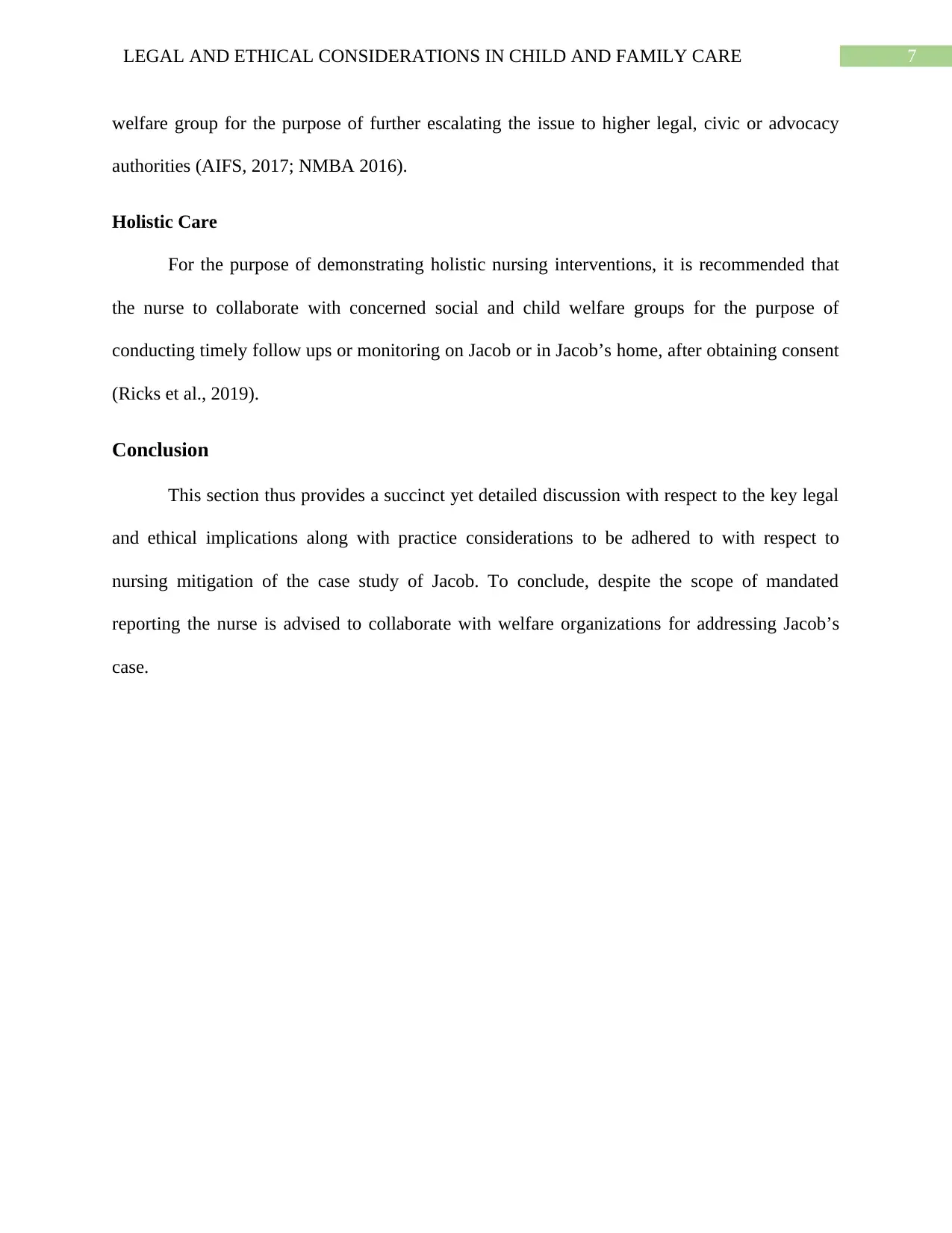
7LEGAL AND ETHICAL CONSIDERATIONS IN CHILD AND FAMILY CARE
welfare group for the purpose of further escalating the issue to higher legal, civic or advocacy
authorities (AIFS, 2017; NMBA 2016).
Holistic Care
For the purpose of demonstrating holistic nursing interventions, it is recommended that
the nurse to collaborate with concerned social and child welfare groups for the purpose of
conducting timely follow ups or monitoring on Jacob or in Jacob’s home, after obtaining consent
(Ricks et al., 2019).
Conclusion
This section thus provides a succinct yet detailed discussion with respect to the key legal
and ethical implications along with practice considerations to be adhered to with respect to
nursing mitigation of the case study of Jacob. To conclude, despite the scope of mandated
reporting the nurse is advised to collaborate with welfare organizations for addressing Jacob’s
case.
welfare group for the purpose of further escalating the issue to higher legal, civic or advocacy
authorities (AIFS, 2017; NMBA 2016).
Holistic Care
For the purpose of demonstrating holistic nursing interventions, it is recommended that
the nurse to collaborate with concerned social and child welfare groups for the purpose of
conducting timely follow ups or monitoring on Jacob or in Jacob’s home, after obtaining consent
(Ricks et al., 2019).
Conclusion
This section thus provides a succinct yet detailed discussion with respect to the key legal
and ethical implications along with practice considerations to be adhered to with respect to
nursing mitigation of the case study of Jacob. To conclude, despite the scope of mandated
reporting the nurse is advised to collaborate with welfare organizations for addressing Jacob’s
case.
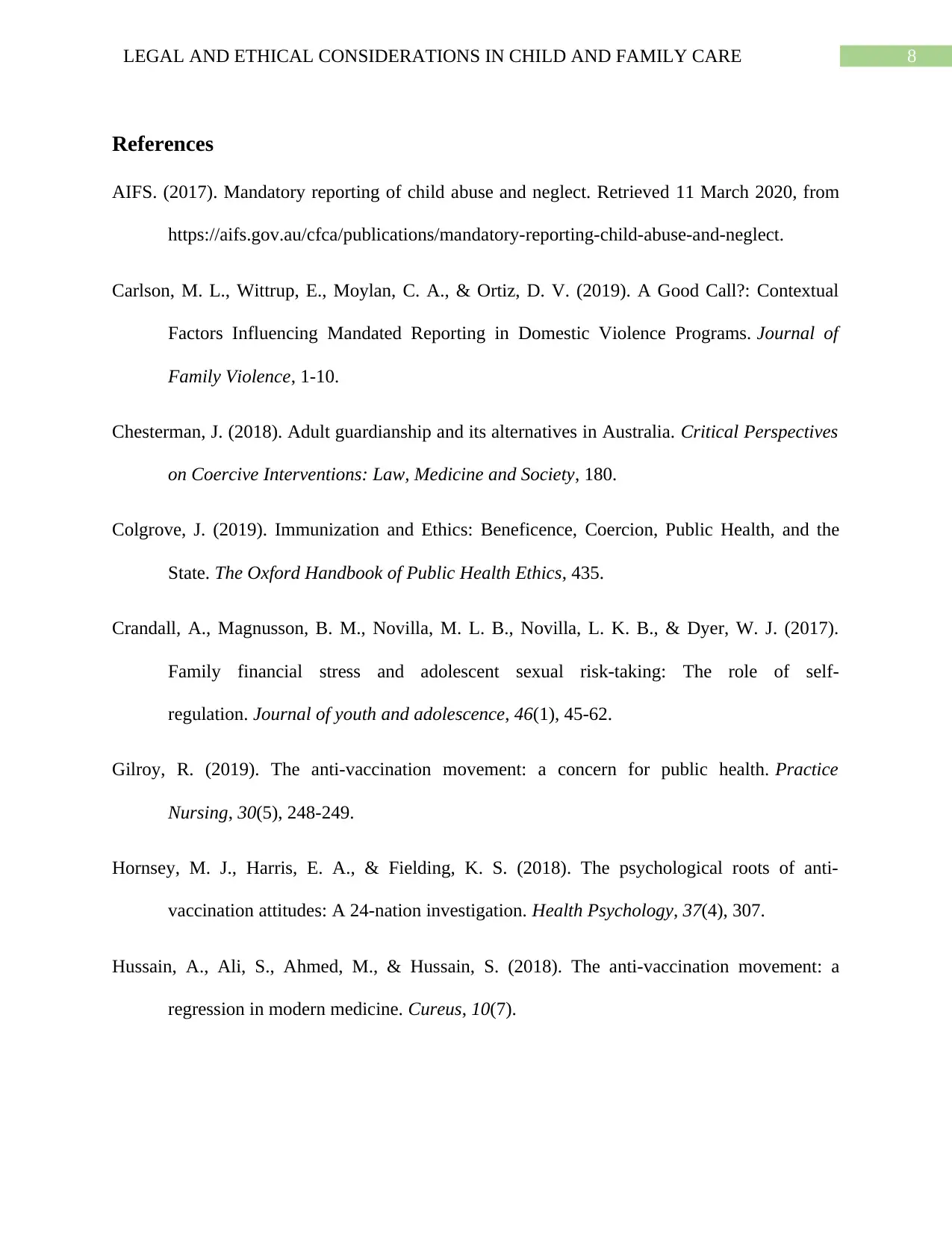
8LEGAL AND ETHICAL CONSIDERATIONS IN CHILD AND FAMILY CARE
References
AIFS. (2017). Mandatory reporting of child abuse and neglect. Retrieved 11 March 2020, from
https://aifs.gov.au/cfca/publications/mandatory-reporting-child-abuse-and-neglect.
Carlson, M. L., Wittrup, E., Moylan, C. A., & Ortiz, D. V. (2019). A Good Call?: Contextual
Factors Influencing Mandated Reporting in Domestic Violence Programs. Journal of
Family Violence, 1-10.
Chesterman, J. (2018). Adult guardianship and its alternatives in Australia. Critical Perspectives
on Coercive Interventions: Law, Medicine and Society, 180.
Colgrove, J. (2019). Immunization and Ethics: Beneficence, Coercion, Public Health, and the
State. The Oxford Handbook of Public Health Ethics, 435.
Crandall, A., Magnusson, B. M., Novilla, M. L. B., Novilla, L. K. B., & Dyer, W. J. (2017).
Family financial stress and adolescent sexual risk-taking: The role of self-
regulation. Journal of youth and adolescence, 46(1), 45-62.
Gilroy, R. (2019). The anti-vaccination movement: a concern for public health. Practice
Nursing, 30(5), 248-249.
Hornsey, M. J., Harris, E. A., & Fielding, K. S. (2018). The psychological roots of anti-
vaccination attitudes: A 24-nation investigation. Health Psychology, 37(4), 307.
Hussain, A., Ali, S., Ahmed, M., & Hussain, S. (2018). The anti-vaccination movement: a
regression in modern medicine. Cureus, 10(7).
References
AIFS. (2017). Mandatory reporting of child abuse and neglect. Retrieved 11 March 2020, from
https://aifs.gov.au/cfca/publications/mandatory-reporting-child-abuse-and-neglect.
Carlson, M. L., Wittrup, E., Moylan, C. A., & Ortiz, D. V. (2019). A Good Call?: Contextual
Factors Influencing Mandated Reporting in Domestic Violence Programs. Journal of
Family Violence, 1-10.
Chesterman, J. (2018). Adult guardianship and its alternatives in Australia. Critical Perspectives
on Coercive Interventions: Law, Medicine and Society, 180.
Colgrove, J. (2019). Immunization and Ethics: Beneficence, Coercion, Public Health, and the
State. The Oxford Handbook of Public Health Ethics, 435.
Crandall, A., Magnusson, B. M., Novilla, M. L. B., Novilla, L. K. B., & Dyer, W. J. (2017).
Family financial stress and adolescent sexual risk-taking: The role of self-
regulation. Journal of youth and adolescence, 46(1), 45-62.
Gilroy, R. (2019). The anti-vaccination movement: a concern for public health. Practice
Nursing, 30(5), 248-249.
Hornsey, M. J., Harris, E. A., & Fielding, K. S. (2018). The psychological roots of anti-
vaccination attitudes: A 24-nation investigation. Health Psychology, 37(4), 307.
Hussain, A., Ali, S., Ahmed, M., & Hussain, S. (2018). The anti-vaccination movement: a
regression in modern medicine. Cureus, 10(7).
⊘ This is a preview!⊘
Do you want full access?
Subscribe today to unlock all pages.

Trusted by 1+ million students worldwide
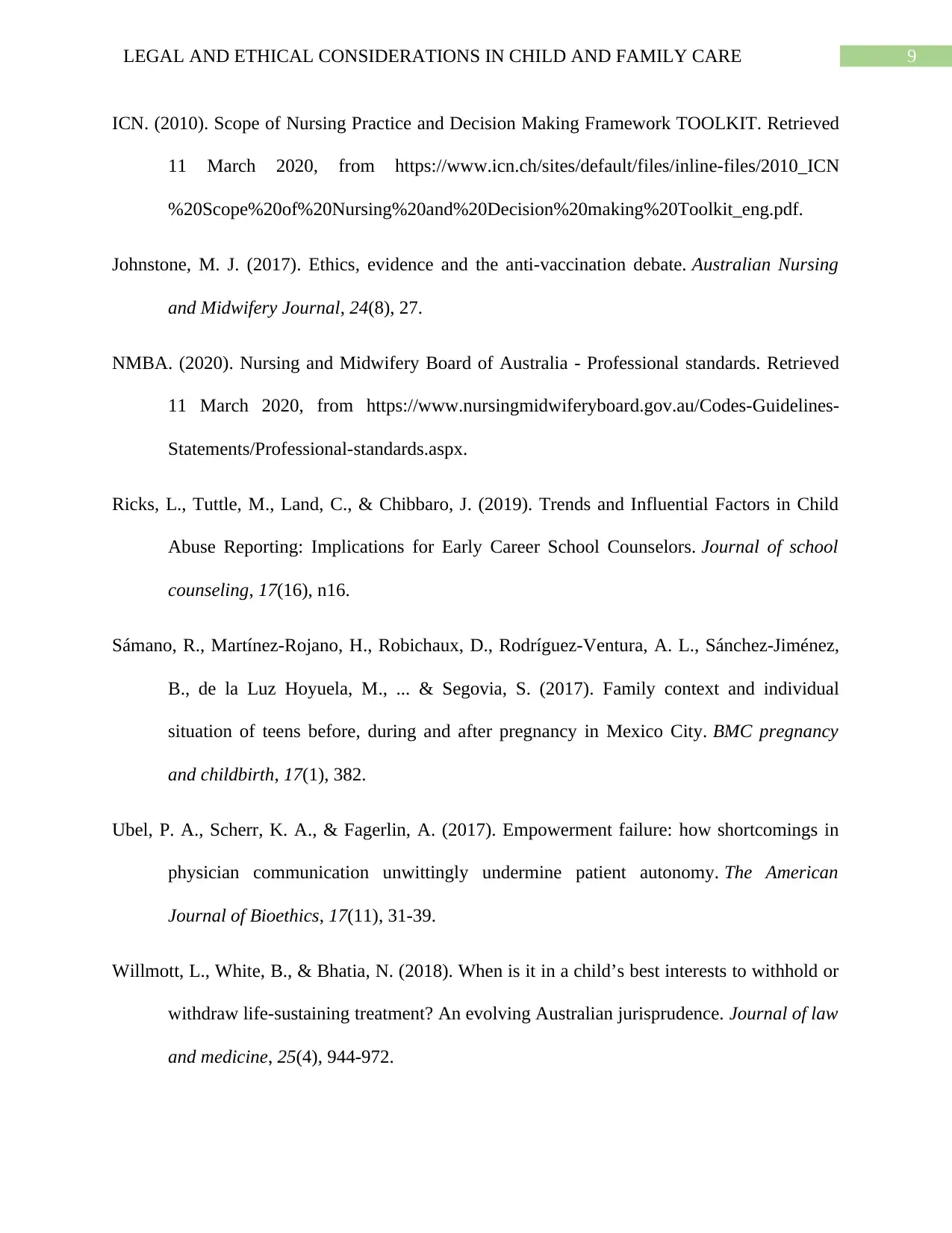
9LEGAL AND ETHICAL CONSIDERATIONS IN CHILD AND FAMILY CARE
ICN. (2010). Scope of Nursing Practice and Decision Making Framework TOOLKIT. Retrieved
11 March 2020, from https://www.icn.ch/sites/default/files/inline-files/2010_ICN
%20Scope%20of%20Nursing%20and%20Decision%20making%20Toolkit_eng.pdf.
Johnstone, M. J. (2017). Ethics, evidence and the anti-vaccination debate. Australian Nursing
and Midwifery Journal, 24(8), 27.
NMBA. (2020). Nursing and Midwifery Board of Australia - Professional standards. Retrieved
11 March 2020, from https://www.nursingmidwiferyboard.gov.au/Codes-Guidelines-
Statements/Professional-standards.aspx.
Ricks, L., Tuttle, M., Land, C., & Chibbaro, J. (2019). Trends and Influential Factors in Child
Abuse Reporting: Implications for Early Career School Counselors. Journal of school
counseling, 17(16), n16.
Sámano, R., Martínez-Rojano, H., Robichaux, D., Rodríguez-Ventura, A. L., Sánchez-Jiménez,
B., de la Luz Hoyuela, M., ... & Segovia, S. (2017). Family context and individual
situation of teens before, during and after pregnancy in Mexico City. BMC pregnancy
and childbirth, 17(1), 382.
Ubel, P. A., Scherr, K. A., & Fagerlin, A. (2017). Empowerment failure: how shortcomings in
physician communication unwittingly undermine patient autonomy. The American
Journal of Bioethics, 17(11), 31-39.
Willmott, L., White, B., & Bhatia, N. (2018). When is it in a child’s best interests to withhold or
withdraw life-sustaining treatment? An evolving Australian jurisprudence. Journal of law
and medicine, 25(4), 944-972.
ICN. (2010). Scope of Nursing Practice and Decision Making Framework TOOLKIT. Retrieved
11 March 2020, from https://www.icn.ch/sites/default/files/inline-files/2010_ICN
%20Scope%20of%20Nursing%20and%20Decision%20making%20Toolkit_eng.pdf.
Johnstone, M. J. (2017). Ethics, evidence and the anti-vaccination debate. Australian Nursing
and Midwifery Journal, 24(8), 27.
NMBA. (2020). Nursing and Midwifery Board of Australia - Professional standards. Retrieved
11 March 2020, from https://www.nursingmidwiferyboard.gov.au/Codes-Guidelines-
Statements/Professional-standards.aspx.
Ricks, L., Tuttle, M., Land, C., & Chibbaro, J. (2019). Trends and Influential Factors in Child
Abuse Reporting: Implications for Early Career School Counselors. Journal of school
counseling, 17(16), n16.
Sámano, R., Martínez-Rojano, H., Robichaux, D., Rodríguez-Ventura, A. L., Sánchez-Jiménez,
B., de la Luz Hoyuela, M., ... & Segovia, S. (2017). Family context and individual
situation of teens before, during and after pregnancy in Mexico City. BMC pregnancy
and childbirth, 17(1), 382.
Ubel, P. A., Scherr, K. A., & Fagerlin, A. (2017). Empowerment failure: how shortcomings in
physician communication unwittingly undermine patient autonomy. The American
Journal of Bioethics, 17(11), 31-39.
Willmott, L., White, B., & Bhatia, N. (2018). When is it in a child’s best interests to withhold or
withdraw life-sustaining treatment? An evolving Australian jurisprudence. Journal of law
and medicine, 25(4), 944-972.
Paraphrase This Document
Need a fresh take? Get an instant paraphrase of this document with our AI Paraphraser
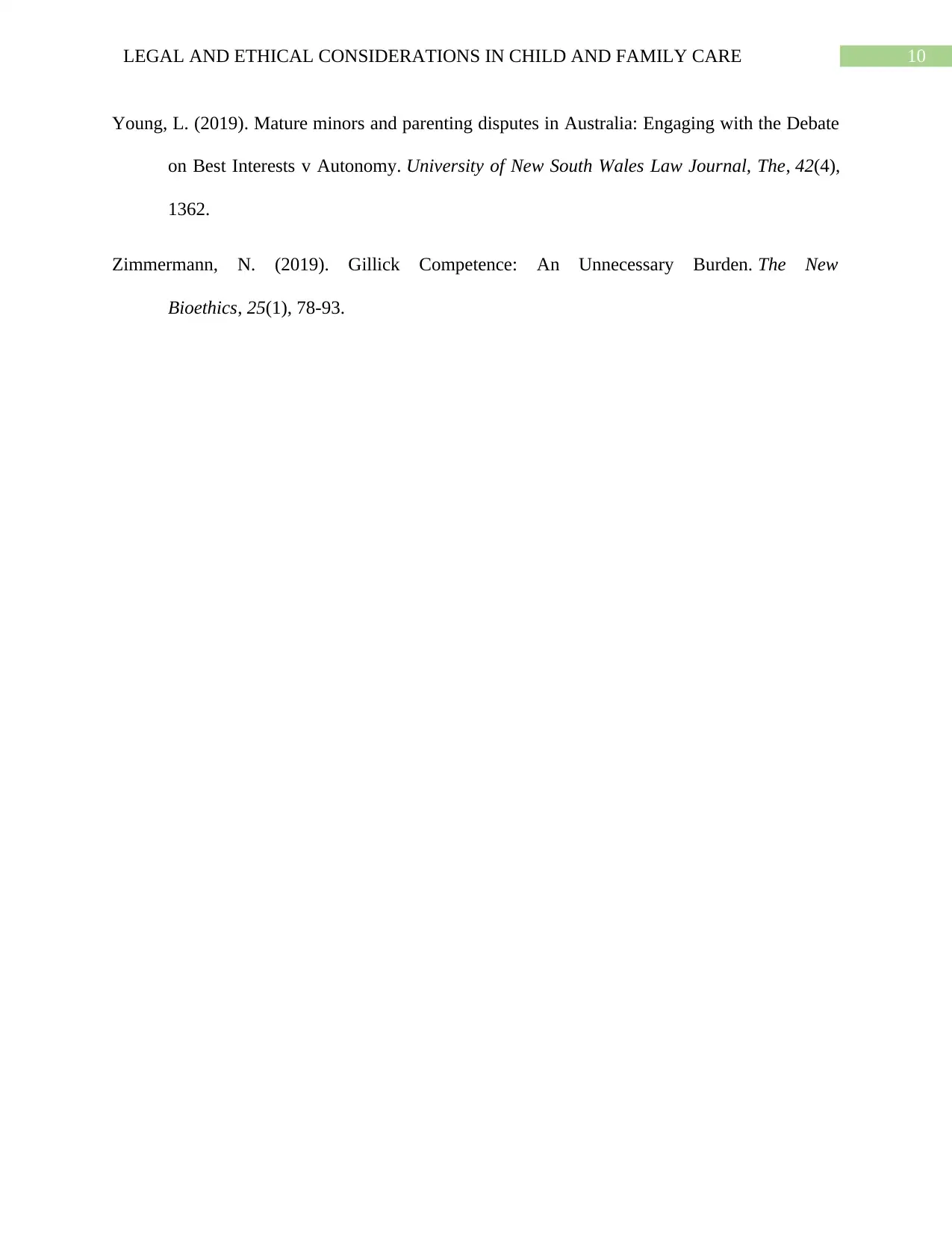
10LEGAL AND ETHICAL CONSIDERATIONS IN CHILD AND FAMILY CARE
Young, L. (2019). Mature minors and parenting disputes in Australia: Engaging with the Debate
on Best Interests v Autonomy. University of New South Wales Law Journal, The, 42(4),
1362.
Zimmermann, N. (2019). Gillick Competence: An Unnecessary Burden. The New
Bioethics, 25(1), 78-93.
Young, L. (2019). Mature minors and parenting disputes in Australia: Engaging with the Debate
on Best Interests v Autonomy. University of New South Wales Law Journal, The, 42(4),
1362.
Zimmermann, N. (2019). Gillick Competence: An Unnecessary Burden. The New
Bioethics, 25(1), 78-93.
1 out of 11
Related Documents
Your All-in-One AI-Powered Toolkit for Academic Success.
+13062052269
info@desklib.com
Available 24*7 on WhatsApp / Email
![[object Object]](/_next/static/media/star-bottom.7253800d.svg)
Unlock your academic potential
Copyright © 2020–2026 A2Z Services. All Rights Reserved. Developed and managed by ZUCOL.





